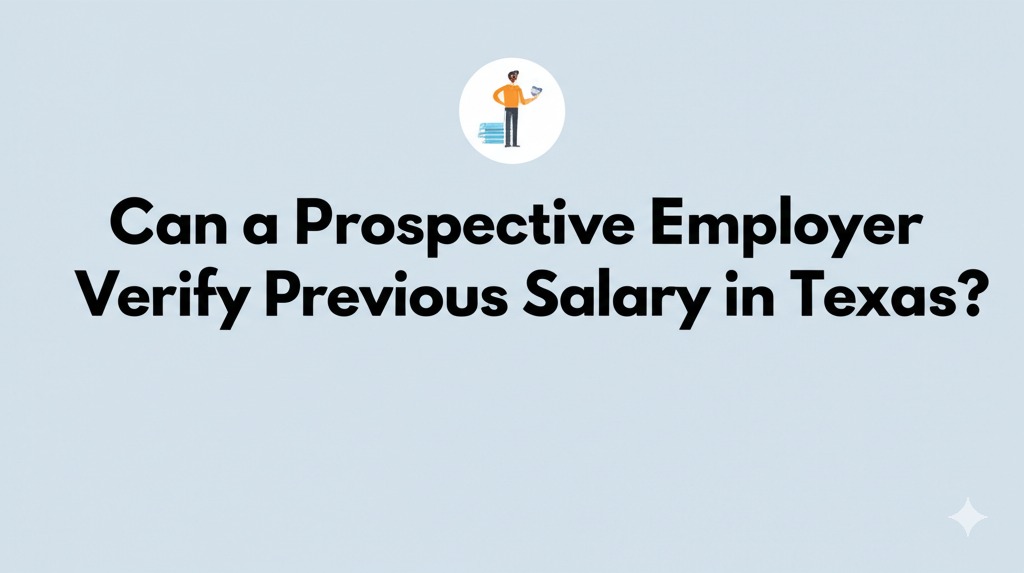
When you’re job hunting in Texas, you might wonder: Can a prospective employer verify my previous salary? It’s a fair question—after all, salary history can impact your future earnings, and not everyone feels comfortable sharing it. Whether you’re aiming to protect your privacy or simply want a fresh start with a new employer, understanding your rights is key.
In this article, we’ll explore the legal landscape in Texas regarding salary history, what employers are allowed to do, and what job seekers need to know to protect themselves.
Understanding Salary History Inquiries
What Is a Salary History Inquiry?
A salary history inquiry occurs when a potential employer asks about your previous wages, compensation, or benefits. These questions may come up during the application process, in interviews, or on background checks.
Why do employers ask?
- To determine your market value.
- To make competitive offers.
- To gauge whether they can afford you.
But is this legal in Texas? Let’s break it down.
Are Salary History Inquiries Legal in Texas?
No Statewide Ban on Asking About Salary
As of now, Texas does not have a statewide law prohibiting employers from:
- Asking about your previous salary.
- Using that information to make compensation decisions.
This means that Texas employers can legally ask about your past earnings, unless restricted by local ordinances or internal company policies.
Can Employers Verify Previous Salary in Texas?
Here’s the core question: Can employers actually verify your salary through official means?
How Employers Might Try to Verify Salary
While employers in Texas can ask, verifying salary is trickier. Here are some ways they might try:
- Contacting your former employer: Some employers may call HR departments to verify job titles and dates of employment. However, most companies have strict policies that prohibit discussing salary.
- Requesting pay stubs or tax documents: Though rare, some employers might ask you directly to provide documentation.
- Running background checks: Standard background checks typically do not include salary data, unless the employer contracts a specialized screening service.
Do They Need Your Consent?
Yes. Verification of employment and salary generally requires your written consent, especially when using third-party services. Without your permission, most employers won’t be able to access sensitive wage information.
Are There Cities in Texas with Salary History Bans?
Unlike states like California or New York, Texas has not passed state-level salary history bans. However, some cities have taken local action.
Austin’s Stance on Salary History
In 2018, Austin passed an ordinance prohibiting city departments from:
- Asking about a job applicant’s salary history.
- Using salary history to determine starting pay.
Note: This law only applies to city government jobs, not private sector employers in Austin.
Should You Share Your Salary History?
Just because an employer can ask doesn’t mean you must answer. You have the right to politely decline or redirect the conversation.
Tips for Handling Salary Questions
- Deflect with confidence: “I’m looking for a role that pays in line with the market and responsibilities.”
- Focus on expectations: “I’d be happy to discuss salary expectations rather than past compensation.”
- Do your research: Use sites like Glassdoor or Payscale to understand what the role typically pays.
Why the Salary History Question Matters
Sharing your salary history can have lasting effects. Here’s why many experts advise against it:
- Anchoring bias: Employers may base their offer on your old salary rather than your value.
- Pay inequality: This practice can perpetuate wage gaps, especially for women and minorities.
- Undervaluation: If you were underpaid in the past, it could hurt your future earnings.
That’s why many states are moving toward banning salary history questions altogether.
What to Do If You Suspect Improper Practices
If you believe a Texas employer is overstepping boundaries or pressuring you unfairly, consider these steps:
- Document interactions: Save emails or notes from conversations about salary verification.
- Contact HR: If you’re already in the hiring process, raise concerns with the company’s human resources department.
- Seek legal advice: An employment attorney can help you understand your rights in more detail.
Conclusion: Know Your Rights, Own Your Worth
In Texas, prospective employers can ask about your salary history, and in some cases, they may try to verify it—with your consent. But that doesn’t mean you have to share. You have every right to focus on what you’re worth now, not what you made then.
Be informed, be confident, and be ready to steer the conversation toward your value—not your history.

Andre Cuevas provides career insights, job search strategies, and professional advice to help individuals navigate the job market and achieve their career goals.






